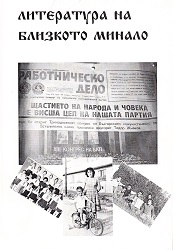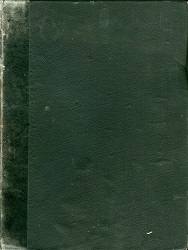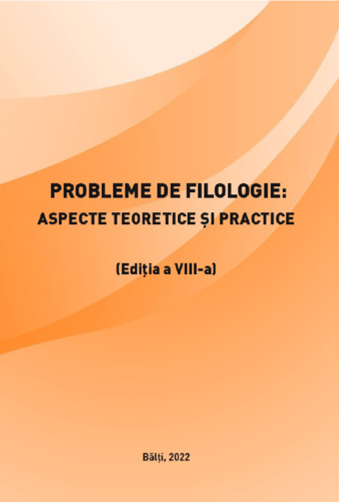
We kindly inform you that, as long as the subject affiliation of our 300.000+ articles is in progress, you might get unsufficient or no results on your third level or second level search. In this case, please broaden your search criteria.


The article deals with the idea of the visible and invisible stairs and steps in literary texts, the ascents and descents (both literal and figurative) along the ladders of the structures and literary borders. During the years of socialism the stairs were a trivially used symbol of going up, conquering heights, an uninterrupted ascent to the highest possible political step – that of communism. Consequently, this also meant the coming of the end of history because beyond this highest level there could not be any other. In the article, this idea is revealed against the background of Flying Heroes and Wayside Dwellings in the collection of Gencho Stoev’s works “Like a swallow”.
More...
This paper focuses on the reader books in the period between 1947 and 1986. The choice of the literature texts and ideological problems in the children`s education are analyzed.
More...
The key role of the construction worker in the building of the sacred communism in Bulgaria is a leading motif in the most of Penio Penev’s poetry works. Proletarian poet most often glorifies the importance of the new man, the man-constructor and his labour efforts, speaking on behalf of the nation in poems such as "His Majesty the Man", "Corpus 206", "Building Spring" and etc. In the majority of Penio Penev`s poetry, he presents the shock-worker as a basic constructive element of the Bulgarian communism’s utopian dream. Penev is generational related to the historical period from the late 40s and early 50s of the Twentieth century, in which he formed himself as a mature creative person. His short poetic life is a series of rise and fall, as it happens with his attitude towards life in general. However, the topic of the construction concentrated on the image of the worker as an engine of a new technical time is a key one and accompanies the author till the very end of his life, which coincides with the loss of relevance of this type of themes in the Bulgarian poetry of the early 60s of the Twentieth century.
More...
The main attention in the article is focused on how social issues are reflected in Marya Grubeshlieva’s works, written before, during and after the Second World War and published in the collected works, entitled „On the threshold” (1955). Internal strategies that determine the nature of fabulation are discussed in terms of utopian social project which Communist Party imposes on the agenda of modern Bulgarian society. In the article is paid attention on the ways in which the authoress tries to create literary texts, subject to the new method in art – socialist realism.
More...
The article studies the poet Ivan Metodiev’s magazine, named Nava as an essential conceptual attempt to understand the world, time and poetry from a point of view which was new to Bulgarian literature – on the borderline between Eastern and natural philosophy and Wittgenstein’s analytic philosophy. Apart from the relation with the eastern forms, these short fragments are rooted in the ancient cultural traditions in Bulgaria. This philosophy of history has its own cosmogony and bears a great deal of positivism.
More...
The play “The trial against the Bogomils” by Stefan Tsanev went out in a typewritten form in 1969 and has not been on Bulgarian stage at the time. The reason is that the party circles at that time perceive the text as an allegory of the political reality of the 60’s in Bulgaria and in the prototypes of the characters they see the authority – `The first` (Todor Zhivkov) and the `Princess` (Lyudmila Zhivkova). In reality, the play turns out not as a ‘hystorical tragedy’, as its author represents it, but rather as a parody of the theater of power. The playwright achieves this effect by means of pictures, revealing the theatricality of the different forms of social life (‘the theatre’ of the court, of history, of the royal institution). The ideology of the Bogomil religious (and the alongside passed parallel with the communism) is strongly and sarcastically diminished by the elements of commedia dell ’arte, burlesque and commedia fool, used in the play.
More...
This article presents the struggle for spiritual survival in the book of poetry “Cry from the Prison” of the poet Joseph Petrov created in captivity during the writer's stay in the Belene concentration camp. Writing camp poetry is not only a protest against violence and acts of dehumanization, but also a process of purification and recovery from the suffered humiliation. The text focuses on the power of the speech, which on one hand causes the imprisonment of the artist, but on the other hand relieves his suffering. Poetry is a kind of self-communication which combines the memories, the imaginary world of the character and the surrounding reality through which the author overcomes the boundaries of the "spiritual" prison. In this sense, the very act of creation is an attempt to preserve his spirit and identity and serves a specific verbal revenge over the torturers. Popularization of the Bulgarian camp poetry will help for a better understanding of the socialist period.
More...
The article deals with the problem of how government assesses the novels of M. Sholokhov – their creative and institutional destiny. The adaptation of the first two novels of the author to the language and expression of the opera make them popular (mass) art. This is one of the weapons of socrealism – to put literature in the field of popular culture.
More...
The article explores the film adaptation process of Bohumil Hrabal’s worldly praised novella Closely Watched Trains. It aims at providing an adequate and sufficient set of approaches to exploring a particular film adaptation from a contemporary point of view. The text explores the possibilities of the socialistic historical reality, the art cinema, the auteur theory of the director’s camera-pen, and the adaptation theories in analysing the Oscar awarded film by Jiří Menzel created with the screenplay partnership of the renowned underground literary author Bohumil Hrabal. Main concerns of the study are: proposing a set of methods and approaches to analysis in the current film case study; elaborating on the notions of perceiving Closely Watched Trains as a Czechoslovak New Wave product, an auteuristic project, and a cult movie; and further expanding on the critically acknowledged idea of the distinctive screen co-authorship between Bohumil Hrabal and Jiří Menzel.
More...
The article discusses the poetry and prose of Anna Barkova in the context of poetic century.
More...
The article is dedicated to the problem of the publication of the translations of Viktor Astafiev’s stories and novels in Bulgarian. The first Astafiev’s book The Horse with a pink mane appeared in 1968 in the Bulgarian language. Vladimir Georgiev was the first translator. In the seventies were translated a lot of creative works. The author of the article examines the problem of the variety of translations of one text. In the eighties Astafiev’s works are published after publishing in Russia and in excellent translations and Astafiev became one of the well-read Soviet writers.
More...

The article is a study based on several opinions of some scholarsthe notorious regarding the passive diathesis, the principles and characteristics of the formation andits application. The research presents the numerous use cases ofpassive constructions in English, the grammatical tenses used andthe changes related to the topic of the sentences.The article highlights the difficulties faced by teachers andstudents in the process of teaching / learning (assimilation) of the passive diathesis andeffective teaching methods to facilitate and consolidate this themegrammar in English classes in secondary school.
More...
The efficient acquisition of a specialized vocabulary in a foreign language is notonly the concern of the students, but also a major concern of the teacher. Thisarticle focuses on the crucial role of the teacher in choosing appropriatestrategies and materials to help improve students’ learning of new terms, bothduring class activities and individual work, as well as on the role of vocabularyin learning English. If English language teaching traditionally focuses on thedetailed study of grammatical rules, to the detriment of vocabulary, along withthe increasing use of communication-based methods, the study of vocabularyshould regain its well-deserved place. Additionally, the article refers to theimportance vocabulary knowledge has in learning a foreign language, whatstudying vocabulary means, the problems that teachers might face when teachingvocabulary to students, as well as techniques that may make teaching vocabularymore attractive to students.
More...
The article attempts to describe the characteristics and the role of thecreative teacher during language classes, motivating and modeling creativestudents, potential specialists in the international labour market. In this context,creativity and innovation play an important role in the education process, asschools and higher education institutions are a key core in developing students'creative and innovative potential for their further professional activities. Thus,creativity is also a necessary element in teaching a foreign language. As weknow, studying a foreign language requires a lot of effort to master. And studentsoften lose interest
More...
The paper presents language learning methods for those who teach BusinessEnglish classes to university students. It also includes several strategies on how144to improve their reading, writing, listening and especially communication skills,while offering advice on how to prepare them to manage in an ever-changing,interdependent, multicultural business environment.
More...
The article deals with the reading rules of letter ”d” in French.Reading in French is a difficult thing to teach and learn, especially to beginners.
More...
The article focuses on ”comparative idioms” in the interculteralcommunication and argues for the need to study them as a means ofimplementing cultural norms. There was made an attempt to reveal the culturalconnotation of some standard images of comparative idioms. A systemic analysisof a contrastive-typological nature, going beyond the confines of a bilingualperspective, is an appropriate theoretical contribution to the field of phraseology.Knowledge of the relationships between meanings, components and variety ofimages, which underlie phraseological comparisons in Germanic, Slavic andRomance languages, is of relevance for European intercultural communication.
More...
Who knows if the people will understand the language we are using now in a fewdecades. Taking a glance around, we’ll notice a mass of new words surroundingus, brought to us both deliberately by language trends or publicity andreflexively through language change over time. Generally, it can be said that themagnification of the English language vocabulary, as well as any other language,is intimately associated with the human’s social life with a high intensity as in230the case of Brexit (Britain / British + exit=UK’s withdrawal from the EU).The new event finds its mirror image in the language: the language grows, ourvocabulary expands, keeping the eyes open for the new words and new usage ofthe old words contemporary men become edge speakers of English language.The key to understand and identify the neologisms’ meaning lies in theirformation’s strategies coinage- contextual clues as close and distance pairs.
More...